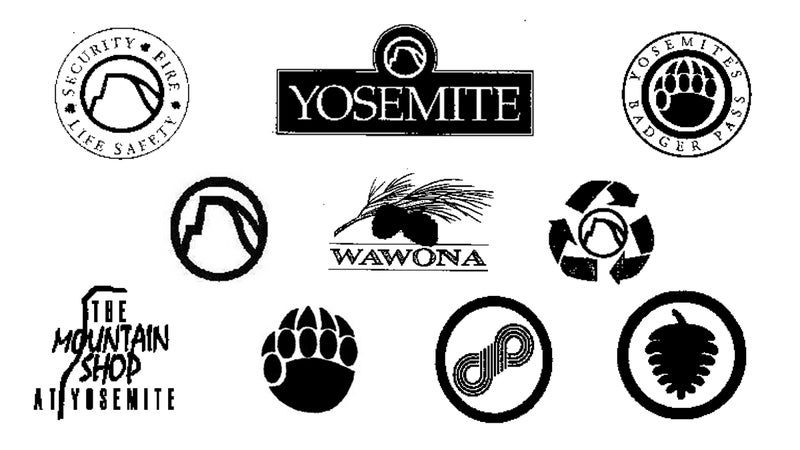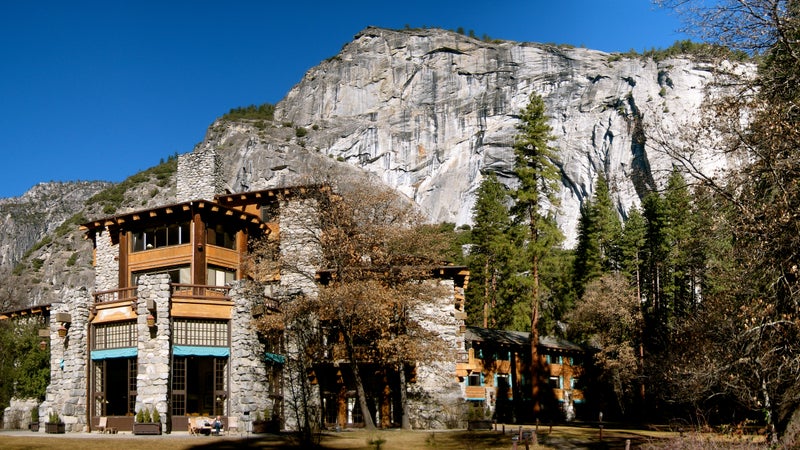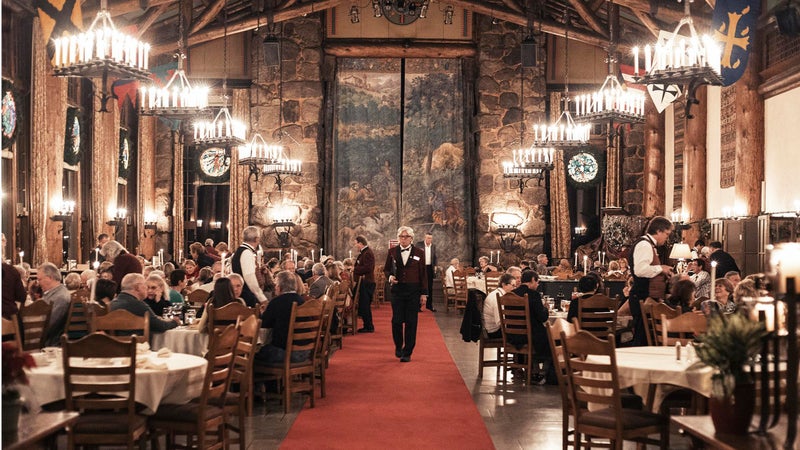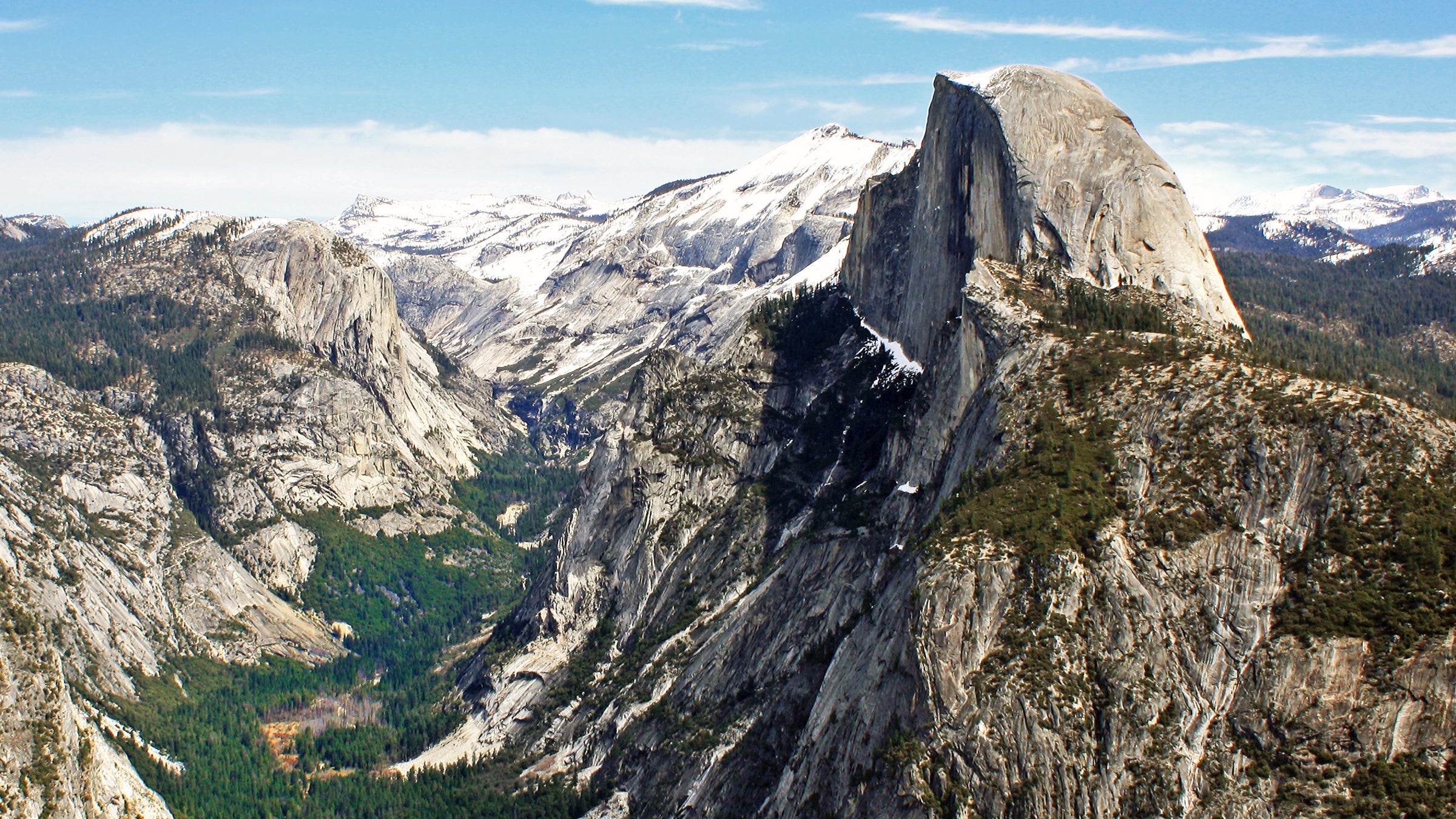Bid goodbye to Yosemite’s familiar Ahwahnee hotel, Yosemite Lodge, the Wawona Hotel, Curry Village, and Badger Pass ski area—or their names, anyway. The National Park Service said today it will rename many well-known spots in Yosemite, as part of an ongoing legal dispute with an outgoing concessionaire that has trademarked many names in the world-famous park.
“While it is unfortunate that we must take this action, changing the names of these facilities will help us provide seamless service to the American public during the transition to the new concessioner,” Yosemite National Park Superintendent Don Neubacher said today.
Among the changes: Yosemite Lodge at the Falls will become Yosemite Valley Lodge; The Ahwahnee Hotel will become the Majestic Yosemite Hotel; Curry Village will become Half Dome Village; Wawona Hotel will become Big Trees Lodge; and Badger Pass Ski Area will become Yosemite Ski & Snowboard Area.
What else might this mean? Officials aren’t sure. The park remains open. And the park service insists that the experience for park visitors won’t change. By March 1, though—the date the new concessionaire takes over—signs all over the park have to be taken down and changed. “It’s not only signs on the hotel, it’s directional signs around the park,” including the famous brown park signs— not to mention marketing materials and brochures and anything else that uses the trademarked words, said Scott Gediman, a spokesman for Yosemite National Park.
Will you be able to buy a Yosemite T-shirt at the gift shop come March 1? “That’s something that remains to be determined.”
The outgoing company also trademarked “Yosemite National Park” for merchandising purposes, said Gediman. Will you be able to buy a Yosemite T-shirt at the gift shop come March 1? “That’s something that remains to be determined,” he said.
The announcement is the latest drama in a long legal dispute between the park service and the concessionaire, DNC Parks & Resorts at Yosemite, Inc. And it comes as the agency kicks off the centennial celebration year of America’s national parks system—when the park service would rather be feting America’s parks, not painting over signs at one of its marquee locations.
The news angered some park watchers.
“It’s a really unfortunate situation where the National Park Service is being held hostage by a corporate concessionaire who clearly does not have the public interest at heart,” said Amy Trainer, executive director of the Environmental Action Committee of West Marin. “I think this is pretty outrageous that the park service, because of a 50-plus-million-dollar lawsuit, is forced to change these historic namesakes,” Trainer said. “It’s a tragedy.”

Since 1993 the park’s concessionaire, DNC, has run the hotels, washed the sheets, sold the horseback rides, and driven the buses in the park. It is a particularly huge job at Yosemite, with its 1,542 guest rooms, 27 food and beverage operations, and 23 retail shops. Uncle Sam owns the land in national parks, oversees the nature, and runs the campgrounds, while concessionaires run the commercial visitor experience, often using their own equipment.
In 2014, the park service decided to open the next contract to new bidders. DNC didn’t get the job. DNC alerted NPS that since 2002 it had been trademarking the names of places throughout the park where the concessionaire worked—the many lodges, the ski hill—and also trademarking images and designs related to the park. In responding to why the government hadn't already trademarked those assets, Gediman wrote in an email that the “general thought was that names of buildings go along with the buildings, and no trademarks were necessary. [DNC] filed for trademarks without telling NPS, and we thought buildings and names went together.”
“It’s a really unfortunate situation where the National Park Service is being held hostage by a corporate concessionaire who clearly does not have the public interest at heart.”
In all, DNC has registered about a dozen Yosemite-related trademarks, including logos and stylized drawings of Half Dome that many park visitors would immediately recognize. When it took over in 1993, DNC had to buy a few other trademarks, including for the phrase “Go Climb a Rock,” seen on many classic Yosemite Mountaineering School T-shirts and bumper stickers. After initial refusal by the U.S. Patent and Trademark Office, DNC also apparently succeeded in trademarking the name “Yosemite National Park” for merchandising purposes. (This wouldn’t require the park to change its name.)
DNC now expects to be bought out by the next concessionaire—a sale that, under the contract, must include “intangible property” such as the many trademarks the company has registered throughout the park, it claims. The company has said this intangible property—trademarks, a database of 750,000 customers, more than a dozen websites—is worth more than $51 million, including some $44 million in trademarks, according to appraisals. The government’s appraisal pegged the total value at $3.5 million.
With more than , the 126-year-old Yosemite is the third most-visited national park, behind only Great Smoky Mountains and Grand Canyon national parks. The contract to feed, house, and sell knick-knacks to all those visitors is the single largest concession contract in the parks system. To win it is coveted; to keep it is lucrative. The next 15-year contract is worth about $2 billion.
Asked if the name-changing announcement was a gambit, Gediman said no. “We have not denied the fact that they do own intellectual property” and deserve to be compensated, said Gediman. “But with these trademarks, it’s kind of two issues: One, are these trademarks valid, and, two, what is the value of them?”
Gediman added, “We feel very strongly that these historic names are associated with the buildings and belong to the American people.” As for the value DNC has attached to them, “We strongly disagree with the numbers,” he said.

In September, after losing the bid for the new contract to a subsidiary of hospitality giant Aramark, the only other bidder, DNC sued the government in federal claims court. In a statement, an attorney for DNC said that it is simply trying to recoup legitimate investments. If NPS were to simply ignore the trademarks and keep using the names, there is the possibility that a court could grant an injunction on use of the names, which could temporarily close the buildings in question.
“We feel very strongly that these historic names are associated with the buildings and belong to the American people.”
In its response earlier this month, the government implied another motive for DNC’s actions: greed. “DNCY’s parent company apparently has embarked upon a business model whereby it collects trademarks to the names of iconic property owned by the United States,” wrote a Department of Justice attorney. The company also has received trademarks for the phrases “Space Shuttle Atlantis,” he noted.
DNC is a subsidiary of Delaware North, one of the largest privately held companies in America. The worldwide hospitality company and its subsidiaries operate food service at many airports and sports stadiums. It also operates the concessions at the Kennedy Space Center Visitor Complex and London’s Wembley Stadium. Its chairman, Jeremy Jacobs, is owner of the Boston Bruins. (The company also owns and operates TD Garden, where the Bruins play.)
A search on the trademark office’s website shows more than 50 trademark applications in all—most apparently successful—for phrases, logos and names, including “Wuksachi Lodge” (in Sequoia National Park), a frequently-seen, stylized logo of Yosemite’s Half Dome, and the phrase “United States Astronaut Hall of Fame.”

At heart, the case is a contract dispute, legal experts say. But it is also raises questions about how much a company can benefit from trademarking buildings and places it operates in a national park—a place that many citizens would consider belonging to the American people, not to any one business.
It’s not unprecedented for a business to trademark a name within a national park; the concessionaire that ran park services for a century prior to DNC taking over had trademarked a few names, including the Ahwahnee, the now-beloved hotel that the concessionaire built, at a time when private companies could own property in parks.
This isn’t the first time even recently that a concessionaire has taken an interest in trademarking names of places in a park. Two years ago, at Grand Canyon National Park, Xanterra Parks & Resorts, which at the time was bidding on a long-term contract as a concessionaire at the park’s South Rim, applied for trademarks for most of the names of existing businesses there—including the El Tovar Hotel, the Bright Angel Lodge, Phantom Ranch, and the Grand Canyon Railway, according to a parks spokeswoman. The park service resisted the move, claiming it controls the names, and asked the concessionaire to desist. The company later filed to stop its pursuit of most of the trademarks, but not all of them, reported , which has written about trademark issues in the parks.
It is possible for a company to develop trademark rights for names such as “Yosemite,” “Curry Pass,” and “Ahwahnee,” depending upon the goods or services that the company is selling in connection with the trademark, says Tim Sitzmann, an intellectual property attorney with Minneapolis firm of Winthrop & Weinstine. If people naturally associate these terms merely with the location rather than a particular source of hotel or restaurant services, however, it may make it difficult to enforce any claimed trademark rights, however, says Sitzmann, who last fall about the dispute.
“DNCY’s parent company apparently has embarked upon a business model whereby it collects trademarks to the names of iconic property owned by the United States.”
The federal government might find some relief, however, in a law Congress passed in late 2014 that allows the government to keep a name that’s historically associated with a building or structure that is either on, or eligible, to be included on the National Register of Historic Places, says Sitzmann. (Many of Yosemite’s buildings are on the register.) But the new law’s wording is a bit vague, he says. “Can DNC also use the marks?” he wondered. “Could DNC maintain an infringement action if the Parks Service or its licensees do more than simply ‘retain the name?’”
Even with the name changes, NPS could still be on the hook to compensate DNC for the value of the trademarks. The case is in court and seems to turn mostly on whether the contract requires some payment, according to Kevin W. Grierson, a trademark attorney at the national law firm Culhane Meadows in Washington, D.C. Based on his reading, “It sounds like (DNC) may have a case,” Grierson says. “I don’t know that changing the name is going to defeat the contract claim,” he added.
Perhaps changing names is an attempt to gain further leverage in negotiations, says Nick Gunn, a trademark and intellectual property attorney in Seattle. “Maybe their thought is that if they change all the names, it drives the value of all those [trademarks] down to zero.”


